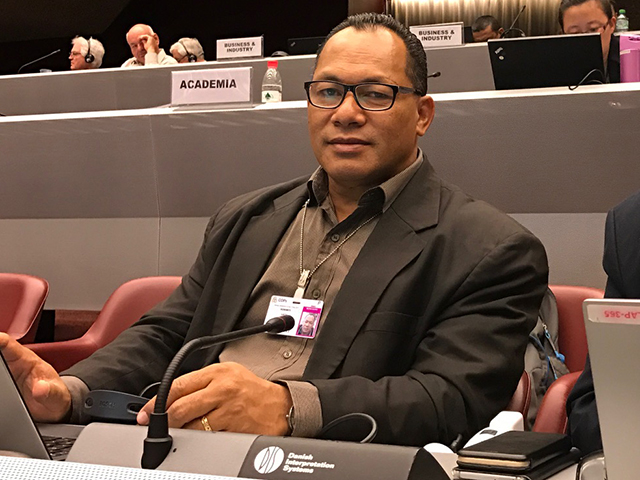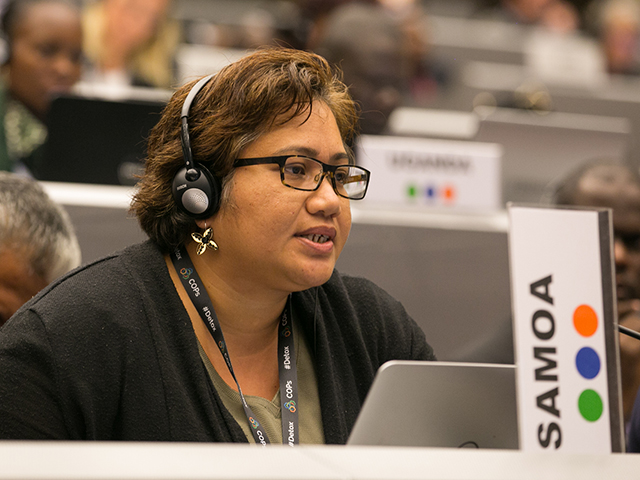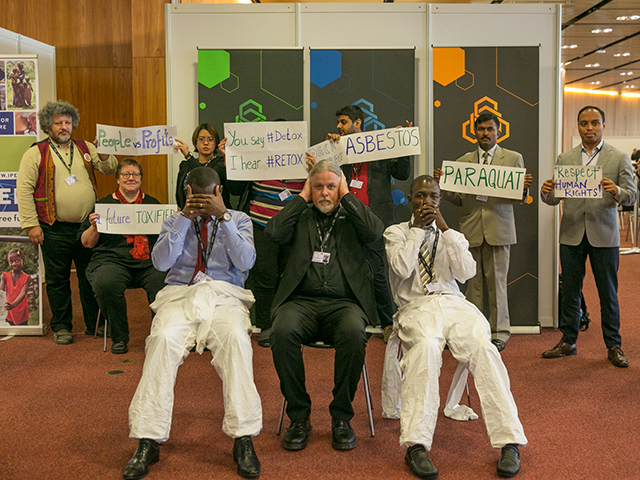
Waste Management and Pollution Control
The Conference of the Parties to the Rotterdam Convention has failed, for the sixth consecutive time, to reach consensus on addressing chrysotile asbestos and paraquat, both of which are known hazardous substances.
The repeated failure of this key Multilateral Environment Agreement has prompted the Director General of the Secretariat of the Pacific Regional Environment Programme (SPREP), Mr Kosi Latu, to call on Pacific island members to address the issue of hazardous substances at a regional level.
Speaking from the Convention in Geneva, Switzerland, Mr Latu explained:
"The Rotterdam Convention was created to help protect countries, particularly the most vulnerable, from unknowingly importing hazardous and toxic substances. The repeated blocking of known harmful substances from being listed in Annex III of the Convention, despite strong support from the majority of Parties, is bitterly disappointing and is contrary to what the Convention was established to achieve."

Like all forms of asbestos, chysotile asbestos causes severe illness and death. The Chemical Review Committee of the Rotterdam Convention agreed to the listing of chrysotile on Annex III of the Convention prior to 2003. However, a small number of Parties continue to take advantage of the Convention's consensus rule to prevent the listing from taking place.
The issue of asbestos in the Pacific came into the spotlight in 2015 following a regional asbestos baseline survey conducted by the European Union-funded PacWaste project. As well as significant legacy stockpiles of asbestos, the survey found that new building materials containing chrysotile asbestos are being imported into the Pacific.

Mr Latu believes that Pacific island nations must now band together to protect the health of their communities and the environment:
"The Rotterdam Convention has failed small island developing states. In light of this, I urge SPREP's Pacific island members to consider support for a regional mechanism to address the influx of hazardous substances into the Pacific region. A Pacific-wide ban on asbestos, for example, would protect our islands from being used as dumping ground for asbestos-containing products that other countries around the world will not accept on account of their own national bans."

Another issue that is of great importance to the health of Pacific island communities and the environment is the use of the toxic pesticide paraquat. Like chysotile asbestos, paraquat, which is used widely in the Pacific region has been debated by Convention delegates at successive COPs but a consensus on its listing has failed to eventuate.
For more information, please contact Amber Carvan ([email protected])
The repeated failure of this key Multilateral Environment Agreement has prompted the Director General of the Secretariat of the Pacific Regional Environment Programme (SPREP), Mr Kosi Latu, to call on Pacific island members to address the issue of hazardous substances at a regional level.
Speaking from the Convention in Geneva, Switzerland, Mr Latu explained:
"The Rotterdam Convention was created to help protect countries, particularly the most vulnerable, from unknowingly importing hazardous and toxic substances. The repeated blocking of known harmful substances from being listed in Annex III of the Convention, despite strong support from the majority of Parties, is bitterly disappointing and is contrary to what the Convention was established to achieve."

Mr Kosi Latu at the Conference of the Parties to the Basel, Rotterdam and Stockholm Conventions in Geneva, Switzerland. Photo: A.Carvan/SPREP
Like all forms of asbestos, chysotile asbestos causes severe illness and death. The Chemical Review Committee of the Rotterdam Convention agreed to the listing of chrysotile on Annex III of the Convention prior to 2003. However, a small number of Parties continue to take advantage of the Convention's consensus rule to prevent the listing from taking place.
The issue of asbestos in the Pacific came into the spotlight in 2015 following a regional asbestos baseline survey conducted by the European Union-funded PacWaste project. As well as significant legacy stockpiles of asbestos, the survey found that new building materials containing chrysotile asbestos are being imported into the Pacific.

Pacific island Parties to the Rotterdam Convention have been vocal in their support of the listing of both chrysotile asbestos and paraquat on Annex III of the Convention. Photo by IISD/Kiara Worth
Mr Latu believes that Pacific island nations must now band together to protect the health of their communities and the environment:
"The Rotterdam Convention has failed small island developing states. In light of this, I urge SPREP's Pacific island members to consider support for a regional mechanism to address the influx of hazardous substances into the Pacific region. A Pacific-wide ban on asbestos, for example, would protect our islands from being used as dumping ground for asbestos-containing products that other countries around the world will not accept on account of their own national bans."

Members of the International POPs Eradication Network (IPEN) urge delegates to take concrete action on chrysotile asbestos and paraquat during the negotiations. Photo by IISD/Kiara Worth
Another issue that is of great importance to the health of Pacific island communities and the environment is the use of the toxic pesticide paraquat. Like chysotile asbestos, paraquat, which is used widely in the Pacific region has been debated by Convention delegates at successive COPs but a consensus on its listing has failed to eventuate.
For more information, please contact Amber Carvan ([email protected])